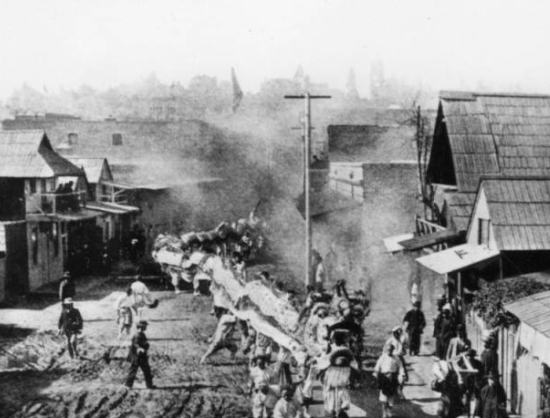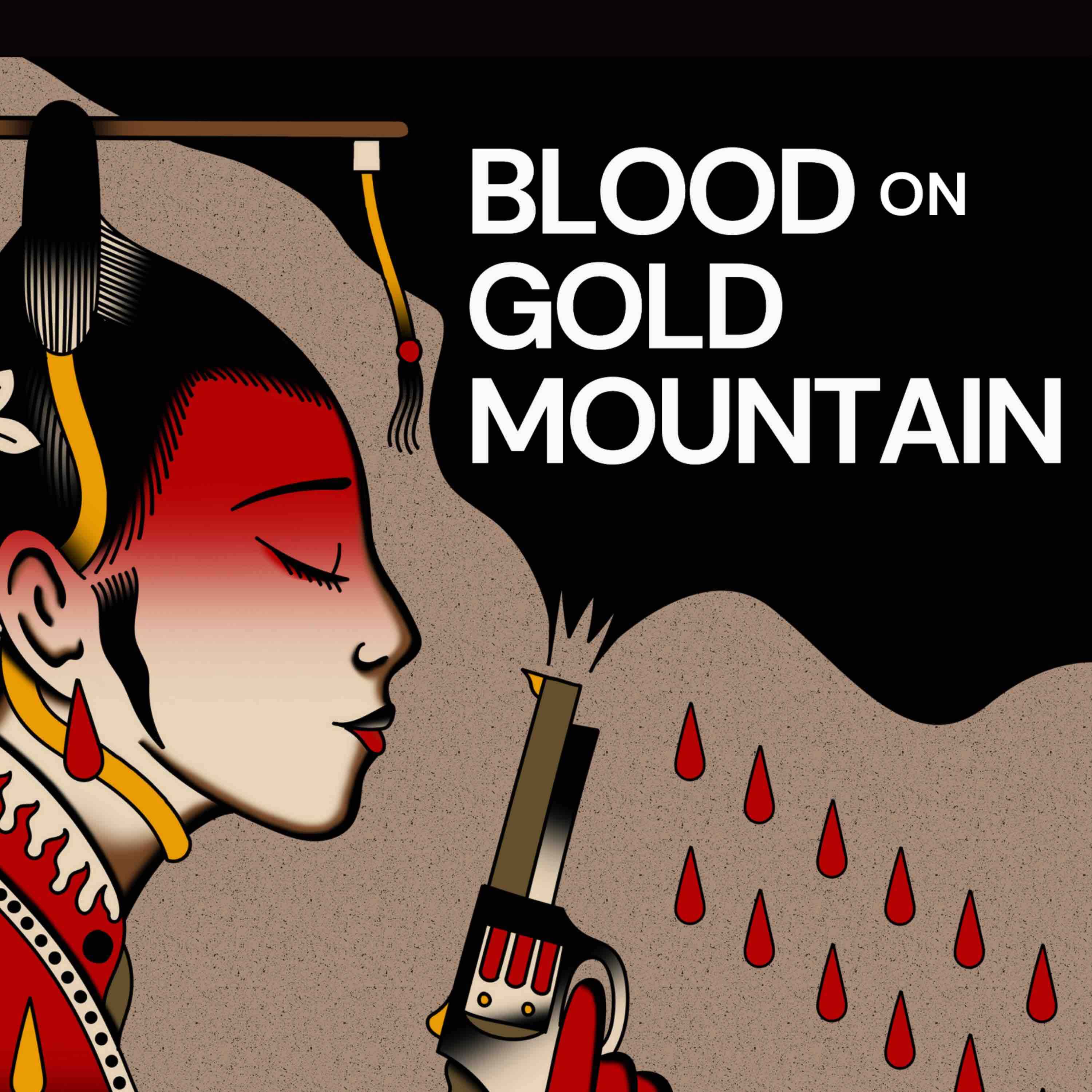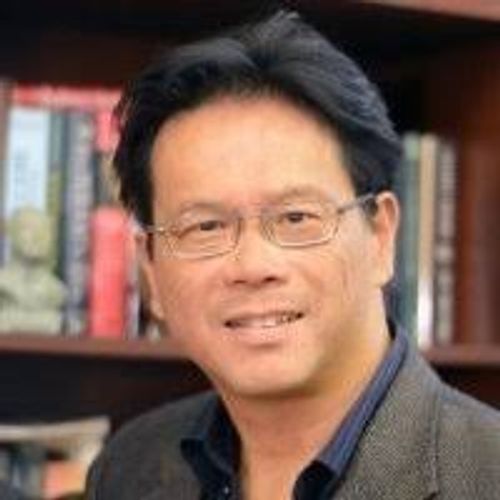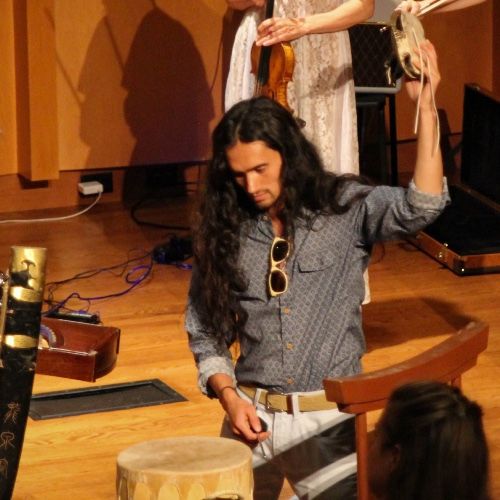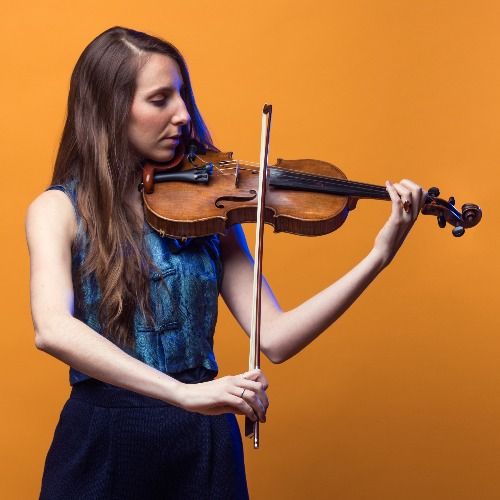Bride Price
Life in California’s early Chinese communities was challenging and dangerous, particularly for women. Discriminatory laws made it harder for women to emigrate, leading to a severe gender imbalance in California’s Chinatowns.
Eve of Exclusion
Initially, the gender gap was a result of American employers’ perception that men were a more desirable form of cheap labor. However, the exclusion of women quickly became a mechanism for preventing Chinese communities from taking root in America. Yut Ho was fortunate to arrive before the Page Act of 1875, which severely restricted emigration of Chinese women by asserting that they were all prostitutes. This was the first US law explicitly restricting immigration and set the precedent for the Chinese Exclusion act.
Forbidden Families: Emigration Experiences of Chinese Women under the Page Law, 1875-1882
Women’s Lives on the Frontier
In fact, most of the Chinese women in California were married and worked as laborers or business owners. According to the 1870 census, there were thirty-four women in LA Chinatown and more than half of them were married. (Zesch, The Chinatown War, 61)
Of those who were unmarried, many were actually prostitutes. This was a normal state of affairs in the wild west; prostitution was was one of few ways American women could make money in frontier towns. Some estimates say that there were over 50,000 prostitutes of all nationalities in the West at the time of the Chinatown Massacre. Frontier society was dominated by rough men and rule of law was a questionable proposition at best. Under these conditions, most women were forced to rely on men, either through marriage or prostitution.
Where East and West Collide
The descriptions of Chinese marriage customs in this episode are based on inside information. While Western portrayals of Chinese women are usually demeaning and disempowering, traditional family structures had an elaborate system of checks and balances between the sexes. This is not to say that Chinese society was immune to patriarchy; it’s just that it contained matriarchal elements as well. The most famous 19th century Chinese matriarch was the Empress Dowager Cixi, who came to power after the first opium war and ruled China until her death in 1908. She belonged to an ancient tradition of female rulers, which dates back at least to the Tang dynasty. On a domestic scale, family matriarchs are still celebrated to this day as in the case of the writer’s grandmother, Yi-Yin Huang, or the fictional “Nai Nai” in the film, Crazy Rich Asians. Gendered divisions of labor are fluid and hard to pin down. However, some polls indicate that women still control finances in the majority of households in China.
Political Theater
Yut Ho’s unusual marital situation is a product of the bizarre ways in which respectability politics shaped LA Chinatown. While many of the details are fictional, it is indisputable that Yut Ho and a number of other Chinese women played a major role in the struggle between factions who vied for control over Chinatown. Yo Hing and Sam Yuen were both fond of accusing their rivals of mistreating women in order to damage their credibility in the press. The strategy was very effective in shaping public opinion, which was crucial in the tight-knit community of LA Chinatown.
If you have questions, thoughts, your own family stories, or historical context to share, please send us a message at @bloodongoldmountain on Facebook or Instagram.
-----
Blood on Gold Mountain is brought to you by The Holmes Performing Arts Fund of The Claremont Colleges, The Pacific Basin Institute of Pomona College, The Office of Public Events and Community Programs at Scripps College, The Scripps College Music Department, and The Entrepreneurial Musicianship Department at The New England Conservatory.
Blood on Gold Mountain was written and produced by Yan-Jie Micah Huang, narrated by Hao Huang, introduced by Emma Gies, and features music composed by Micah Huang and performed by Micah Huang and Emma Gies. A special thanks to Jonah Huang for collaborative keyboard composition, Muqi Li for guest guzheng, Kusuma Tri Saputro for the amazing artwork, Sheila Kolesaire for her critical PR guidance, Rachel Huang for her editing prowess, and Evo Terra from Simpler Media Productions for his immense expertise and support.
-----
More details at bloodongoldmountain.com
Transcript
Previously on Blood on Gold Mountain: Ah Choy told Yut Ho how he became a fugitive after splitting up with his mining group. Hunted with his back to the sea, he was taken in by a beautiful, young widow with a terrible secret. The widow taught Ah Choy about her language and culture and showed him that Gwailo can be friends as well as foes. The two of them shared a blissful spring in her cabin by the sea until local townsmen got wind of their tryst. The result was a tragic showdown between forbidden love and vigilante justice.
Hao:South of the Great Valley, it began to get hot. This was not the humid, salt-sea heat of their homeland, but a savage glare that beat down on the carriage and made the ceiling hot to the touch. The grass which had been so lush and abundant in the north grew here in patches and clumps, so dry that Yut Ho wondered if it were alive at all.
Strange new plants began to appear between these patches of dry grass. In the low places between hills, scaly clusters that looked like lizard flesh brought forth a profusion of thorn-covered fruits. Up on the heights perched plants that resembled nothing so much as spherical bundles of spear-blades. Out of the centers of the largest ones, improbably long stalks protruded skyward, their tops covered in hundreds of small yellow flowers.
As they wound their way through steep, crumbling canyons of ancient red-brown stone, Yut Ho strained her ears for the welcoming sound of running water, but to no avail. Here, all was silent except the rumble of their wheels on the cracked dirt road, and the steady tread of their horses’ hooves. High above, a lone vulture circled in a pitiless blue sky.
In time, the road made its way down to level ground, and the travelers emerged from between two rugged buttes into a massive open space; a flat, shining disc of land surrounded on three sides by mountains whose naked stone peaks seemed to scrape the sky. On the fourth side, Yut Ho’s vision was occluded by a golden haze, beyond which she could sense, rather than see, the ocean stretching away towards the invisible horizon, and the life she had left behind.
The plain was bisected by a narrow corridor of green; a river, out from which the familiar shapes of fields and orchards radiated, and there, right at the center of it all, was the town.
It was not a big town, Yut Ho thought. Much larger than a village, but nothing at all like the sprawling, smoky monstrosities of human industry she had seen in Guangzhou and San Francisco. Still, there was something restless about the place. Something ominous. As they entered the outskirts of town, Yut Ho saw an unusual number of buildings under construction. There was malignity in the eyes of the dusty Gwailo workmen who turned their heads to watch the carriage go by. As they entered the town proper, the number of people on the streets increased, but their glances did not grow more friendly. Yut Ho saw people pointing at them, and once or twice someone even shouted something at them in Gwailo. She reached out, and pulled the shutters to.
“They look like Manchu,” she observed, affecting a kind of terse confidence which she did not actually feel. Ah Choy frowned. “They are like Manchu. Remember what the old man said? This is not their native land. This is land that they conquered. They swagger around with the confidence and foolishness of a conquering people. Be careful around them, Mei. Don’t talk to them, hassle them or do anything that might make them feel threatened. Treat them like we treated Manchu back home, and avoid them as much as you can.”
Yut Ho Nodded. She was picturing a scene from the war which she had often tried to forget: a Manchu official, tall and pale skinned in his ridiculous silk robe, dragging a peasant boy through the streets of Guangzhou by his long braid. “you dare bump into me, you little Baiyue rat?!” the big man had shouted “Fifty lashes will teach you some respect!” It occurred to her that though their village had nominally been under Manchu rule, she had never seen more than a small group of Imperial soldiers until the rebellion. Here, though, it was hard for her to tell if there were any natives left at all.
“How am I supposed to avoid the Gwailo?” She asked testily. “They’re everywhere!”
Ah Choy shrugged. “I said ‘as much as you can.’ But I actually don’t think that will be too much of a problem.” There was a shout from the driver, and before Yut Ho could ask him what in the world he was talking about, Ah Choy reached out and threw the shutters wide.
They were in a broad, dusty square where several packed-dirt roads converged in front of a long, low building. The place was decrepit. A number of boards were missing from the covered walkway that stretched along its sun-bleached façade, and the whole thing looked like it could collapse at any moment. Just then, however, none of that mattered to Yut Ho. All that mattered was the people.
There were nearly a hundred of them, moving in and out of a number of doors ranged along the building’s face. She could hear Sze Yup being spoken, as well as one or two other dialects she recognized from Guangzhou. Many people were carrying bags, satchels or bundles of familiar goods, and Yut Ho eagerly inhaled the delicious smell of steamed fish and vegetables which wafted out of the building’s interior. The carriage drew up alongside the sagging gallery, and rolled to a stop.
“This building is called the Coronel,” Ah Choy told her. Then, pointing out the door into what appeared to be the busiest shop of all, he continued. “There should be a guide waiting for us in the Nin Yung store. Your Husband wants him to escort us to the house. I suppose they’re concerned for your safety. That’s fine. I’ll go in and see if I can find him. I think it’s probably best if you stay here, and keep an eye out for trouble.” With that, he turned and swung out into the blazing sunlight, leaving Yut Ho to wonder exactly what kind of trouble she was supposed to be on the lookout for.
A man was standing near the far end of the Coronel building. He was wearing a dark, tailored suit of the kind worn by Gwailo Businessmen. Indeed, Yut Ho nearly mistook him for a Gwailo at first glance. He was stocky and massive; not tall like Ah Choy, but barrel-chested with arms that seemed almost unnaturally long compared to the rest of his body. He had a bushy black beard, and a bald head–not plucked in the front with a single braid, like a common laborer, but completely and totally bald. It glinted in the sun, because among all the people in the market square, this man alone wore no hat. The oppressive afternoon heat seemed not to affect him at all.
The man’s eyes seemed to cut through the crowd, like a shark through shoals of fish. They took in the entire scene, missing nothing, and then came to rest on the small crowd of people gathered outside the Nin Yung Store.
Yut Ho was not, as a rule, intimidated by people. She knew the extent and limitations of her own strength and influence. Experience had taught her when to fight, and when to run and hide. But there was no hiding from this man’s gaze.
Don’t see me, she thought, almost against her will. Don’t look.
Instantly, almost as though he had heard her or sensed the intensity of her thought, the man in the dark suit turned his head, and looked straight at her.
Suddenly, the carriage door swung open. Yut Ho swore and jumped what felt like halfway out of her skin, but it was only Ah Choy, cramming his long frame into the dark interior, and grinning.
Once he had settled himself into the seat opposite Yut Ho, Ah Choy gestured to a man who was standing politely outside the door. “This is Tong Won,” He informed Yut Ho. “He’ll be riding shotgun up top with the driver on our way to your Husband’s house.” The man inclined his head, and smiled. He was lanky and elegant, with a waist-length braid that was streaked with gray.
“Good afternoon, Mr. Tong,” said Yut Ho. Then, gesturing discreetly out the window, she lowered her voice and asked, “who is that man in the dark suit?”
Ah Choy shrugged, but Tong Won’s face was grim. “That,” he said, carefully avoiding the man’s gaze, “is Yo Hing. He’s the most dangerous man in Chinatown, except maybe Sam Yuen. Anyway, he’s taking a little too much of an interest in us for my taste. Driver!”
The next moment, they were rattling over the packed dirt of the square, away from where Yo Hing stood. As they rounded a corner, Yut Ho stole a glance out the window. Yo Hing had not moved, but he was still looking at the carriage. It was hard to tell at this distance, but Yut Ho thought she could read something like amusement on his face.
Ah Choy produced an orange, and began peeling it in an uncharacteristically careful manner. He made a stack out of the pieces of skin, but it quickly toppled over due to their quick pace, and the poor condition of the road. “There won’t be oranges for much longer,” he said without looking up. “Pretty soon it’ll be fall, and that’s grape season. You’ll love grapes, Mei, make your husband get them for you all the time; he can afford it. They’re kind of like lychees, but they have no shell and the seeds are really small.” He handed her half of the orange, and Yut Ho felt a wave of memories break over her. The two of them, sharing lychees down by the irrigation ditch behind their parents’ house and throwing the rinds into the water. The song their Gong Gong used to sing when he came to help their parents bring in the rice harvest each fall. Ah Choy, sitting on his heels in the summer heat, complaining that there was nothing to do. The village, their home, nestled in the foothills of the green, green mountains where it had been since the beginning and where it should have been until the end of the world. Now it was gone. Five years ago she had said goodbye to Ah Choy when the village burned and they went their separate ways. Now he was here with her in this carriage, her brother, the only person left who could remember their old life, and it was time to say goodbye again.
“I’m afraid there won’t be any kind of ceremony,” Ah Choy was saying. “Since we have no family, there’s not really any point. After all, I’m nobody important. Hired muscle. Your passage over here was the Bride Price, and we worked out a deal since I couldn’t afford to pay your dowry, so I’m really in no position to negotiate–“
“Choy.” Said Yut Ho sharply. “Look at me. Look in my eyes.”
Ah Choy looked down at her with a pained, fretful expression.
“Now listen.” said Yut Ho. “You’ve done all you can. You saved my life once by arriving at the village in time to warn us before the Imperial soldiers arrived. Then you kept me alive for five years with the money you sent back to us in Guangzhou, and THEN, as if that weren’t enough, you somehow managed to get this merchant or whatever he is, this Hing Sing, to marry me sight unseen and ship me across the ocean so I didn’t end up in a whorehouse or worse after Mother and Father died. You did this despite being “hired muscle” and having no money for a dowry. You’ve done your part, and a pretty good job of it at that. Now it’s time for you to let go.”
For a long moment, Ah Choy was silent. Then his worried expression cracked into a grin. “I guess there’s probably not a man in Gold Mountain who’s your match when it comes to cleverness or strength of spirit,” he said with a certain amount of pride.
Yut Ho thought of Yo Hing. “I don’t know about that, but I do know that I can take care of myself. So stop worrying! Anyway, you know what Gong Gong always said: It’s obvious which of us got the brains and which of us got the brawn.” Back in the village, that kind of statement would have driven Ah Choy crazy. Now, he just laughed. “That reminds me,” he said. “I have something for you.” He rummaged around in his pockets for a minute, finally fishing out a small, circular pendant carved out of bone. It bore a familiar octagonal pattern composed of broken and unbroken lines. Yut Ho gasped. “Gong Gong’s Ba Gua!” Ah Choy gave it to her, and she ran her thumb over it, feeling its smooth face and the familiar rough place on one of the edges. “How in the world did you get this?” she asked. “Gong Gong gave it to me before I left to join the rebel army,” Ah Choy replied, still grinning. “He said it protects you from harm. Wards off confusion and reflects it onto your enemies. Makes you bulletproof. He told me I should wear it at all times, but I want you to have it now. Look on the back.”
Yut Ho flipped over the medallion. On the side opposite the Ba Gua was a character carved in Ah Choy’s crudely elegant hand. Double Happiness.
“Just do me one favor,” Ah Choy said as the carriage slowed, then ground to a halt. “The magic in that thing belongs to you, and you alone. Don’t show that to your husband until he’s proved that you can trust him.”
Yut Ho Nodded. She slipped the pendant around her neck, and tucked it out of sight under her tunic. Then she reached out and embraced Ah Choy for a brief, precious moment before the carriage door opened, and she stepped out into the blinding sun.
Yut Ho knew that married life would contain elements of the unexpected. Nevertheless, she had expectations.
In the villages, marriage was important not only as a bond between bride and groom, but also as an alliance between two families. When young women were married, they left their parents’ home and went to live with their husband’s family. From then on, the two families were linked by a bond more powerful than any other social institution in China: the bond of kinship. They were honor-bound to look after each other, sharing goods and opportunities in times of prosperity, and helping each other out in times of need.
Yut Ho’s family was very humble, with few connections. Her father’s side were simple farmers, who had been hard-hit by generations of tribal conflict even before the great war. Her mother’s side lived up in the mountains that surrounded the village, and were slightly better off. They could often spare a few hands come harvest time, including Yut Ho’s maternal grandfather, her beloved Gong Gong. The smallness of Yut Ho’s family fostered deep personal connections between its members, but it left them terribly vulnerable to the vicissitudes of war and famine.
Bigger families with more extensive kinship networks fared better. They could call on relatives for food or shelter, and band together in the face of danger. The most influential clans of all lived as feudal lords, always tipping the scales of local commerce and politics in their favor.
Most well-connected families lived in large compounds containing multiple generations of parents, children, aunties and uncles who all worked together to look after the family’s interests. Generally, the men were in charge of outward-facing activities such as hunting, fishing and trade, while the women were in charge of managing the compound and its resources including money, food storage, and childcare. Individuals’ status within the compound was dictated by social factors like friendship and personal loyalty, but it was understood that in a pinch, one should always defer to anyone in a previous generation. Children were obligated to their parents, aunties and uncles, who were obligated in turn to their own parents, aunties, and uncles. Young brides were also obligated to their mothers-in-law, who were more powerful than the young women’s husbands, but often less sympathetic.
At the top of the generational hierarchy was the matriarch. As the oldest and most experienced member of the household, she ruled over men’s affairs through her sons, and over women’s affairs through her daughters and daughters-in-law. A young woman who managed to win the matriarch’s esteem would enjoy special status in the compound, gaining ascendancy over her husband and perhaps even her mother-in-law. On the other hand, a far-sighted young bride would try to be diplomatic with all of the older women, understanding that any of them could be next in line for the matriarch’s chair. It was not unheard of for an old man to hold the top spot, from time to time, but it wasn’t common, and it usually didn’t last. Since women tended to live longer, the old lion would rule side by side with his wife, and when he went to join the ancestors, she would rule alone. The matriarch was a figure of immense power and authority; the critical link between the living family and a thousand earlier generations. It was hard to believe that she, too, had once been a young bride entering the compound on her wedding day.
This was the future that Yut Ho had envisioned when she learned that Ah Choy had managed to arrange a marriage for her.
As it turned out, married life on Gold Mountain was completely different.
It wasn’t long before Yut Ho realized that she would never feel at home in her husband’s house. It was huge; ten times the size of Yut Ho’s family cottage; like an entire compound all by itself. The whole thing was made out of wood, from the exposed rafters all the way down to the floors, which would groan and squeal like hungry ghosts when trodden upon. Yut Ho had seen glass windows in Guangzhou; now she lived behind them in an insulated world of filtered light and shadow.
The house even had two floors. Its lower story fronted onto Calle de los Negros, which seemed to be Chinatown’s principal street. Yut Ho’s husband Hing Sing conducted his business downstairs, with people always coming, going, and generating a tremendous amount of noise. In fact, Yut Ho quickly came to understand that Hing Sing practically lived down there. She only saw him when he came upstairs to eat or bathe. Hing Sing was a tall, thin man in middle age, who stooped down to normal height as though he was too polite to make people look up. He was perfectly civil, always smiling when he saw Yut Ho and asking whether she was comfortable.
Physically, Yut Ho was very comfortable. Her wardrobe contained multiple outfits, some of which fit quite well. She had the upper story of the house all to herself, except for a hired servant named Lee Yong who prepared all of the meals and kept the entire place clean and tidy. It was comfort like nothing Yut Ho had ever experienced before, but her mind was uneasy. There was nothing for her to do. No books to balance, no nieces or nephews to look after. No aunties, uncles or mother-in-law. Yut Ho was lonely and bored, but there was no question of her leaving the house. It was clear that Chinatown was an extremely dangerous place. Yut Ho’s glass windows commanded a street view of several hundred yards, and within a week of her arrival she had seen innumerable arguments, multiple fights and one incident which certainly looked like murder. In the back of her mind, she also remembered her encounter with Yo Hing. She wondered why Tong Won, their guide, had been in such a hurry to get away from him.
Hing Sing’s strange behavior was another cause for concern. The day of Yut Ho’s arrival, he had asked her to please refrain from coming downstairs. This was not unusual in itself; plenty of couples in China did some of their daily work in designated men’s or women’s spaces. In Yut Ho’s case, however, consenting to Hing Sing’s request placed her in near-isolation. She felt like she was trapped backstage at a theater, and nobody had bothered to tell her when the show would begin, or what part she was expected to play.
In the first week of her residence at the house, Hing Sing never came to her room. Yut Ho liked the idea of having children, but she did not find Hing Sing attractive, and so her heart sank when, one night as she was getting ready for bed, she heard the long-awaited knock on her bedroom door.
Yut Ho straightened up and tucked her Gong Gong’s medallion out of sight in the folds of her tunic, which was draped over the back of a chair. “Come in,” she said stiffly.
The door creaked open and Hing Sing shuffled in, accompanied by a distinctive, smoky aroma that Yut Ho recognized but couldn’t quite place. He wandered into the room, followed by two women Yut Ho had never seen before. One of them was tall and thin, with her hair up in a tight bun. She was dressed in a fitted gown which she wore very well even though its fabric was cheap and it had several visible stains. The woman would have been beautiful, Yut Ho thought, if not for the skeletal gauntness of her pale face, which combined with an abundance of brightly-colored makeup to give her the aspect of a painted corpse.
The other woman was about Yut Ho’s height, with a girlish face and a striking, voluptuous figure. She wore simple peasant clothes, with her hair plaited into twin braids which hung thick and heavy down the front of her tunic. No makeup adorned her smooth, dark face but a sweet perfume filled the room when she entered. Her deep, dark eyes swept over the scene in an instant, taking everything in, and giving nothing away.
Yut Ho looked up at Hing Sing, whose face was arranged into a sort of vacant smile. “Good evening, husband.” She said coldly. “Who are these women, and what are they doing in my room?”
Hing Sing blinked, but his smile did not slip, and in a moment he had regained his composure. “Of course!” he said, clapping his hands together, “you don’t know each other. How silly of me! Ladies, this is Yut Ho. My, ahem. Wife. Yut Ho, allow me to introduce you to Phoenix” He indicated the tall, pale woman, “and Jade.” The short, dark woman nodded once as Hing Sing went on. “They are my, ah…” “Friends,” offered Phoenix. Her voice was high and piercing, like a bone flute. “Associates,” said Jade. Her voice was low and musical, with a gentle rasp to it which Yut Ho did not find altogether displeasing. The Three newcomers looked at each other. Then they burst out laughing.
“As far as why we’re here,” Phoenix oozed forward and placed a long, bony hand on Yut Ho’s shoulder. It felt hard, and cold. Jade had somehow managed to get behind Yut Ho, and was speaking softly in her ear. “Hing Sing thought it might be nice for us to introduce this sweet little country girl to the thousand pleasures of life in Gold Mountain.” She was so close that her body was pressed against Yut Ho’s upper arm. It felt very warm, and very soft.
Yut Ho looked at Hing Sing, who was trying to get out of his robe but seemed to be having trouble with the knotted silk buttons. He moved slowly, almost as though he was underwater. Yut Ho’s nostrils were full of Jade’s perfume, but as Hing Sing drew closer, she was struck again by a subtle, smoky odor. It was sharp and smooth, and this time she knew at once what it was: Opium. She felt a wave of revulsion, and stepped forward, brushing off Phoenix’s hand and one of Jade’s heavy braids from her shoulders. “Hing Sing,” she said in a strong, clear voice, “thought wrong.”
Hing Sing looked up from his buttons and stared at Yut Ho for a moment. Then he glanced over at Phoenix, who raised one painted eyebrow, and shrugged.
“I didn’t come here for the thousand pleasures of Gold Mountain,” Said Yut Ho. “I came here for an arranged marriage to a respectable merchant; an alliance between his family and mine. Now, I discover that my brother was deceived. Hing Sing has given me no responsibilities because he has no family and no need for a wife. All he wants to do is keep me here as one of his concubines, like a bird in a bamboo cage!”
Yut Ho’s voice had risen to a full-throated shout. She stood there with her fists clenched and the blood singing in her ears, waiting for someone to make the next move. The others stared at her in shocked silence.
Suddenly, Phoenix began to laugh. She slapped her long, bony hand against her long, bony thigh, and leaned her elbow on Jade’s shoulder for support. “Concubines! Did you hear that Hing Sing? You’ve finally made it in this world. We’re your concubines! All hail the Emperor of Gold Mountain!”
Hing Sing looked down at his half-unbuttoned robe. Then he began to laugh as well, covering his mouth as though he had witnessed something embarrassing. Yut Ho looked around in confusion.
Jade was shaking her head and smiling. “Well Hing Sing, it looks like you and Phoenix each owe me a dollar. I told you this wasn’t going to work. Too bad though,” She glanced carelessly at Yut Ho. “She could have been a lot of fun. Got some spice to her, and so deliciously fresh” She lingered on the last word as though enjoying its flavor, and then addressed Yut Ho directly.
“You’re right. Your brother was deceived because Hing Sing told him a bunch of lies.” “Concocted by Jade,” offered Phoenix. “Concocted in consultation with me,” corrected Jade. “It wasn’t hard. Ah Choy is not the brightest, as I’m sure you know, and he was very eager to believe that he had found a stable home for his beloved sister.” “Adorable,” sighed Phoenix. Sing Lee covered his mouth again. Jade went on. “You have observed that Hing Sing doesn’t have a family. Perhaps you’ve also figured out that he’s not a merchant. As far as respectability, that’s where you come in. You see, there have been some changes going on at our local benevolent society, and part of Hing Sing’s job is to make sure that all the members are comfortable with the new rules. He has a lot of influence with the young bachelors, but some of the older family men have shown a bit of hesitation. They need to be reassured, and so it’s your job to show up at banquets, sit next to Hing Sing and smile so that everyone can see how domestic the two of you are. That’s all there is to it. You don’t even have to talk. Just look pretty and remind the men of their own wives back home in China. I think you should be able to handle that.”
Yut Ho bristled at her condescending tone, but Jade did not give her the chance to interrupt.
“As for me and Phoenix, we’re not concubines. This isn’t the forbidden city. We’re just a couple of poor village girls like you, except we had to make our way in the world alone without any big muscle-head brothers to try and take care of us. We’re whores, little sister. And Hing Sing? Well, some might call him a pimp or a pander,” “Or a madam,” interjected Phoenix. Jade ignored her and continued, “But the truth is, he’s just another kind of whore.” “We sell our bodies by the hour,” Phoenix explained, walking over to Hing Sing and draping a bony arm over his shoulders, “He sold his entire life to Sam Yuen a long time ago.” Yut Ho had heard that name before, but where? Her mind felt numb and shaky, as if it had been submerged in freezing water.
“So,” said Jade. She strode across the room, brushing against Yut Ho as she passed. Her touch was so soft that it gave Yut Ho a little, involuntary shiver. “Don’t waste your time dreaming about alliances, or families. And don’t bother trying to get in contact with your brother.” “He’s so strong and handsome,” said Phoenix. “It would be a shame if he were to get himself hurt by doing something stupid.”
“Such a shame,” Echoed Jade. For a split second, she looked terribly sad, and Yut Ho wondered what memories lived behind those dark, liquid eyes. Then the moment was gone, and the eyes turned hard and shiny like polished stone. “Just show up to the banquets, play the respectable wife, and we’ll leave you alone.” Said Jade. “Even Hing Sing.”
“After all,” cooed Phoenix as she steered Yut Ho’s husband out of the door, “He’s got us.”
Jade paused in the doorway as the other two stumbled down the hall. She looked very pretty standing there in the dark, and very dangerous.
“Welcome to Los Angeles,” she said quietly. Then she turned and shut the door, leaving Yut Ho alone with the lingering scent of her perfume.
Emma:If you enjoyed the show and want to hear more, tell us in a review, and become one of our community backers at www.bloodongoldmountain.com/support. Remember to follow us wherever you listen to podcasts, and reach out with thoughts and questions on Instagram and Facebook at Blood On Gold Mountain. Episode 5, “Empire of Orphans,” will be released on Wednesday May 19th. Blood on Gold Mountain is brought to you by The Holmes Performing Arts Fund of The Claremont Colleges, The Pacific Basin Institute of Pomona College, The Public Events Office at Scripps College, The Scripps College Music Department, and The Entrepreneurial Musicianship Department at The New England Conservatory. It is hosted by Hao Huang, Micah Huang, and Emma Gies, featuring original music by Micah Huang and The Flower Pistils. A special thanks to Jonah Huang for collaborative keyboard composition, Muqi Li for guest guzheng, Kusuma Tre Saputro for the amazing artwork, Sheila Kolesaire for her critical PR guidance, Rachel Huang for her editing prowess, and Evo Terra from Simpler Media Productions for his immense expertise and support. Thanks for listening and see you next time.

